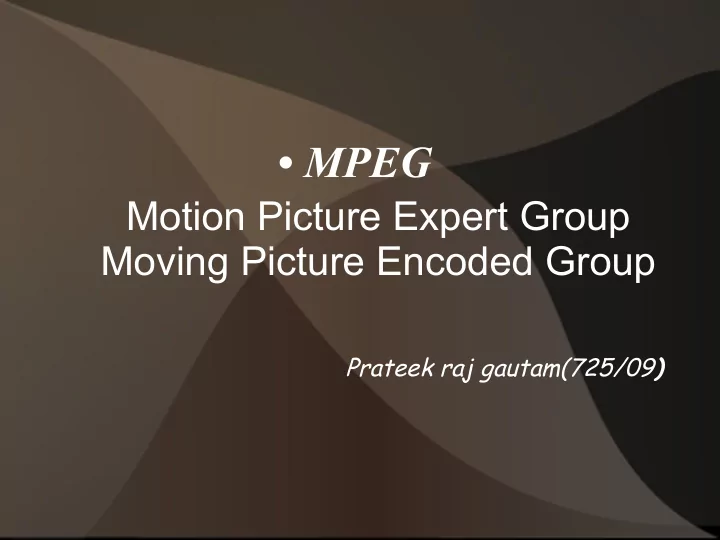

• MPEG Motion Picture Expert Group Moving Picture Encoded Group Prateek raj gautam(725/09 )
MPEG-1 Optimized for bitrates around 1.5 Mbit/s • mainly designed for error-free digital storage media • multiplexing of audio, video and data • 352x240 pixels a 30 frames/sec [ NTSC based ] • 352x288 pixels at 25 frames/sec [ PAL based ] Applications • CD, digital multimedia, and video database (e.g. video-on-demand)
MPEG-2 • 2-15 or 16-80 Mbit/s bit rate • Applications: • satellite, cable, and terrestrial broadcasting, digital networks, and digital VCR
Basics of MPEG Types of pictures frames I (intra) frame compressed using only intraframe coding Moderate compression but faster random access P (predicted) frame Coded with motion compression using past I frames or P frames Can be used as reference pictures for additional motion compensation B (bidirectional) frame Coded by motion compensation by either past or future I or P frames D (DC) frame Limited use: encodes only DC components of intraframe coding
FRAME SEQUENCE
MPEG Compression is Based on Processing 8 x 8 Pixel Blocks
Only Moving Areas Have to Be Coded
MOTION VECTOR
MOTION VECTOR • Try to match each block in the actual picture to content in the previous picture. Matching is made by shifting each of the 8 x 8 blocks of the • Two successive pictures pixel by pixel each direction -> Motion vector • Substract the two blocks -> Difference block • Transmit the motion vector and the difference block
MPEG: Video Encoding Regulator + Frame Quantizer VLC DCT Memory - (Q) Encoder Q -1 Buffer Pre e s m r o processing IDCT a t r c f e e v v n Output i + t o c i i t d Input o e M r Motion P Frame Compensation Memory Motion Estimation
MPEG-2 Why another standard? − Support higher bit rates e.g., 80-100 Mbits/s for HDTV instead of the 1.15 Mvits/s for SIF − Support a larger number of applications − The encoding standard should be a toolkit rather than a flat procedure Interlaced and non-interlaced frame Different color subsampling modes e.g., 4:2:2, 4:2:0, 4:4:4 Flexible quantization schemes – can be changed at picture level Scalable bit-streams Profiles and levels
THANK YOU
Recommend
More recommend